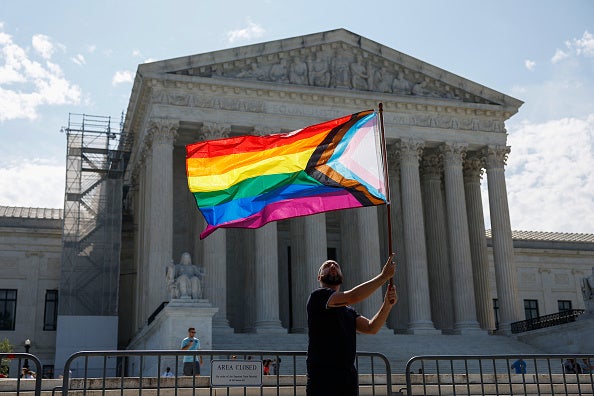The Supreme Court will hear arguments Tuesday in a closely-watched test case on whether existing bans on so-called “conversion therapy” for children, already in place in almost half of U.S. states, are constitutional.
Conversion therapy – a practice promoted by some religious conservatives – attempts to pressure gay and lesbian children to identify as heterosexual and transgender youths to conform to the gender assigned at birth. It has long been condemned by major medical groups as harmful and discredited.
This week’s case focuses on a 2019 Colorado law which bars licensed therapists from attempting to change a child’s sexual orientation or gender identity, but does not extend to religious groups or family members.
The challenge comes from Kaley Chiles, a Christian counselor who argues the measure violates her First Amendment rights by preventing her from offering voluntary, faith‑based counseling.
The Supreme Court has a 6-3 conservative majority and therefore often backs conservative “free speech” claims. Chiles has also won the backing of President Donald Trump’s Republican administration and several conservative allies.

Chiles has said she believes “people flourish when they live consistently with God’s design, including their biological sex,” according to an AP report, and she is set to argue that evidence of harm from her approach is lacking.
The State of Colorado contends that the law regulates health care, not speech, and says this law is designed to protect children from a practice known to be linked to depression, anxiety, and suicidal thoughts.
“The only thing that the law prohibits therapists from doing is performing a treatment that seeks the predetermined outcome of changing a minor’s sexual orientation or gender identity because that treatment is unsafe and ineffective,” state attorneys wrote.
Colorado has not sanctioned anyone under the law since it was brought in, and which exempts religious ministries.
State attorneys contend that in the law’s existing form it still allows any therapist to have wide-ranging, faith-based conversations with young patients about gender and sexuality.
Nonetheless violations do carry potential fines of up to $5,000 and the risk of license suspension or revocation.
The case, Chiles v. Salazar, comes just months after the Court’s conservative majority upheld state bans on transition‑related health care for transgender youths, a ruling seen as a major setback for LGBTQ rights.
Later this term the Supreme Court is also expected to hear a case on transgender athletes’ participation in school sports.
For families, the stakes are deeply personal. Linda Robertson, a Christian mother from Washington state, recalled how her son Ryan was subjected to conversion therapy after coming out at age 12, AP reports. When the treatment failed, he blamed himself, spiraled into shame and depression, and died in 2009 at age 20 after multiple suicide attempts and a drug overdose.
“What happened in conversion therapy, it devastated Ryan’s bond with me and my husband,” she said. “And it absolutely destroyed his confidence he could ever be loved or accepted by God.”
Colorado Attorney General Phil Weiser, a Democrat, warned in court filings that striking down the state’s law could undermine not only bans on conversion therapy but also broader efforts to regulate medical treatments deemed unsafe or ineffective by experts.
“For centuries, states have regulated professional healthcare to protect patients from substandard treatment. Throughout that time, the First Amendment has never barred states’ ability to prohibit substandard care, regardless of whether it is carried out through words,” he wrote.
Chiles, represented by the conservative Christian legal group Alliance Defending Freedom, argued in her court filings that counseling amounts to “vital speech that helps young people better understand themselves.”
